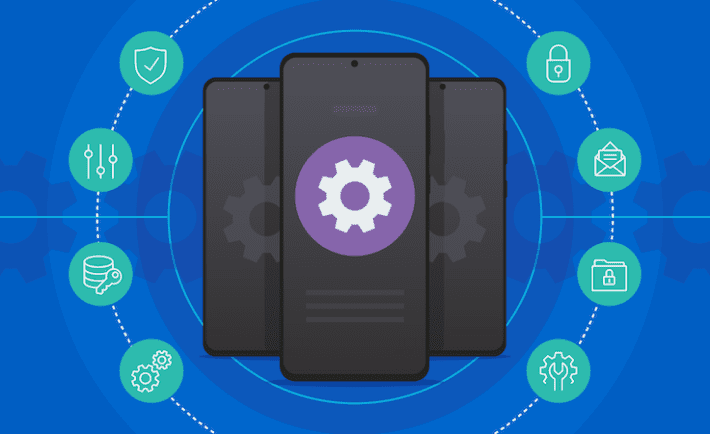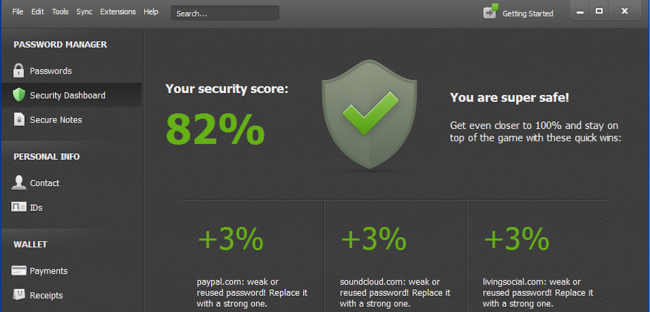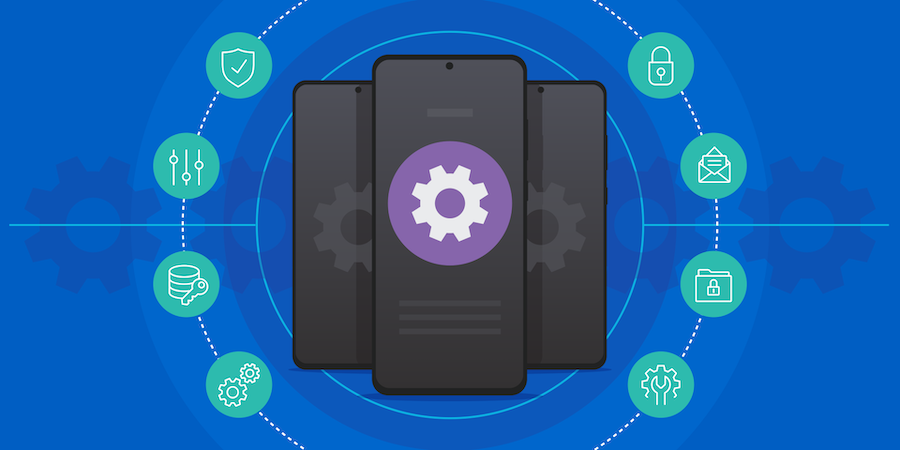
Your small business’ data is essential, and we know this and understand that you must maintain a trustworthy reputation for continued progression and success. That is why we want to share with you five tips about cybersecurity solutions for small businesses to ensure your business stays secure so you can concentrate on your workplace’s primary demands.
As a business owner, one of your top priorities should be to look after your cybersecurity or outsource the support. Fundera statistics show that in 2021, 43% of cyberattacks were directed at small businesses. But there is a silver lining, system failure and human errors contribute to 52% of cybersecurity breaches. You can minimize and control these threats by using the tips we are about to share in this article.
1. Mandatory Strong Password Policy

It is best to set passwords that are three random words. It stops hackers from getting access to your data by using phrases or words that are personal to you. Additionally, it will be best to include a multi-factor authentication process for all your employees’ log-ins. Another Fundera report showed that throughout 2021, 52% of all breaches resulted from system failure and human error, like employees having weak passwords, making this a worthwhile decision to implement.
Implementing multi-factor authentication means you use multiple methods to sign in. One of the most common ways of implementing this method is after signing in with your password, a code is sent to your phone or email, and you must also sign in with this code. It will be best not to save your passwords on your device to prevent them from easy access. For instance, do not save your passwords on your device or phone, as it is easier to obtain your information if they are stolen.
Consider adding a lockout to your small business if you want it to have a third preventative measure. It means that users will be given a specific number of times to sign in before getting locked out. It will be best to pick between 5 to 10 attempts before a user gets locked out.
Here are things your password should not include for cybersecurity purposes:
– Your birthplace
– Personal address
– Family names
– A pet’s name
– Your birthday
-Your name
Here are things your password can include:
– Special characters
– Numbers
– Mix lower-case and uppercase letters
– Random words made into a phrase
2. Have A Strong Backup System

Perhaps the first and most vital thing to help improve your cybersecurity is building or maintaining a resistant and strong backup system for your small business. Doing this ensures that in the unfortunate case that your small business experiences a breach, you are less likely to lose your data permanently. To ensure that you lose no data, it will be best to backup your systems as regularly as possible.
Please aim to backup your data every other day, week, month, and year. Furthermore, it will be best to save all your backups in a different location. It will allow your small business the best protection from losing all its data and improve your chances of recovering the data quickly as it is stored elsewhere. One of the best ways to avoid getting hacked is to invest in a strong backup system.
Another approach to improving cybersecurity in your business is ensuring you have updated systems and keep them updated with the latest security patches. Doing so prevents your business from having continuous weak spots. Consider incorporating this into your security strategy, and it is also worth ensuring that only the right personnel in your business have access to the backup. It ensures and guarantees that you will not have any problems with any employee who may have ill intentions.
Pro Tip:
It is essential to ensure the device you select to add to your backup is protected. You can do this by using a physical product like a portable hard drive. When it is securely and correctly stored, you will have a lower risk of individuals accessing the data by losing or hacking the data should your device get damaged or corrupted.
You can also confirm that your backup is secure by adding an encryption service to the device containing your backup. Doing so means that your data will come back as code unless someone knows the password. They will not be able to have full access to the stored data, hence, significantly improving your cyber security.
3. Limit User Access
Limiting user access is another excellent way of improving cybersecurity. Ensure you limit the number of individuals accessing the business’ data. You can establish which individuals should access the data by factoring in who needs to see the data for their work. You can determine this by considering the offices or buildings required to see the data and determine what systems should hold it and the employees you want to offer access to.
After you establish what devices and who is allowed to access the data, you can brief them about why they need to keep the information confidential. Let them know that they should only access the data when it is necessary, and there is no need to access this data if it is not required. In addition, the individuals with access to this data must ensure they set up strong passwords to access the data. For instance, it is best to add multi-factor authentication (it can be a series of security codes or passwords that must be sent to their devices before they are allowed access) to help prevent people from hacking your business and obtaining the data.
You should develop a password that is a combination of 3words which are not associated with anything personal to you, as it makes it hard for hackers to break through.
Lastly, an alternative measure you can employ in your business’ cybersecurity is a system where all ex-employees are instantly removed from your business system when they leave. Doing so ensures they have fewer chances of accessing your data, selling it, or using it against you. We highly recommend incorporating this approach into your strategy.
4. Mobile Device Policy

Enforcing a mobile device policy in the workplace is a tip that you should employ to improve your small business’s cybersecurity. This policy ensures you protect the data and confidential information your employees’ access. You can also add a mobile device policy as most individuals use their phones to access information from work, including emails. They often save the details of this information on their phones to save time when they need to go over this information.
Here are the possible threats you may face from mobile devices:
– Data leaked
– Phishing scams
– Unsecured Wi-Fi networks
– Downloading intentionally vicious aps
All these threats can threaten to have your business’ data stolen, resulting in your business receiving a poor reputation for poorly handling confidential information.
One of the best ways to handle this is ensuring your employees individually set up passwords on their devices. Some devices may allow one to add a password to access their emails, which is worth implementing. Alternatively, you can also reduce the risk of an attack by requesting your employees to install encrypted data and security apps. Doing so will create an additional layer of protection between your small business and a cyberattack. If an employee’s device gets hacked or stolen, you are guaranteed it has several layers of protection.
5. Software And Patch Updates

While this may appear to be a straightforward measure to enforce to improve your small business’s cybersecurity, most businesses forget to implement this measure. Those businesses that do not forget about it push it for a further date, but the fact remains that whatever provider you use has found bugs and weaknesses in their service. Based on this, you should make it a mandatory practice to finish the update as soon as they are available. It is essential to install these updates when they are made available immediately.
According to Verizon,28% of small businesses account for data breach victims. You can prevent breaches and attacks if your business has the appropriate systems and latest patches or software installed.
You can improve your malware protection by completing these updates, meaning that your business is:
– Less prone to harm from intentionally disruptive software
– Protected from viruses
– Protected from unauthorized individuals gaining access to sensitive information
Getting updates can help fix any crucial security flaws. Otherwise, hackers may write a code to exploit and take advantage of the weakness. An additional benefit is that your data is protected, meaning hackers will have difficulty trying to obtain your details that they could use against you.
One of the ways to make sure that you never forget to update your device is to go to your device’s settings and allow automatic updates. Enabling automatic updates takes the pressure off you and ensures your device always has the latest updates to secure your data. Alternatively, you can set timers and reminders on your phone that alert you. It would help if you took time out to install the updates so you do not lose any of your work on the progress.




